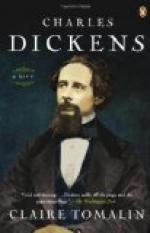of little Paul, and when the lad dies one quite feels
that the light has gone out of the book. “David
Copperfield” shorn of David’s childhood
and youth would be a far less admirable performance.
The hero of “Oliver Twist” is a boy.
Pip is a boy through a fair portion of “Great
Expectations.” The heroine of “The
Old Curiosity Shop” is, as I have just said,
a girl. And of all these children, the one who
seems, from the first, to have stood highest in popular
favour, and won most hearts, is Little Nell.
Ay me, what tears have been shed over her weary wanderings
with that absurd old gambling grandfather of hers;
how many persons have sorrowed over her untimely end
as if she had been a daughter or a sister. High
and low, literate and illiterate, over nearly all
has she cast her spell. Hood, he who sang the
“Song of the Shirt,” paid her the tribute
of his admiration, and Jeffrey, the hard-headed old
judge and editor of The Edinburgh Review, the
tribute of his tears. Landor volleyed forth his
thunderous praises over her grave, likening her to
Juliet and Desdemona. Nay, Dickens himself sadly
bewailed her fate, described himself as being the
“wretchedest of the wretched” when it drew
near, and shut himself from all society as if he had
suffered a real bereavement. While as to the
feeling which she has excited in the breasts of the
illiterate, we may take Mr. Bret Harte’s account
of the haggard golddiggers by the roaring Californian
camp fire, who throw down their cards to listen to
her story, and, for the nonce, are softened and humanized.[14]—Such
is the sympathy she has created. And for the
description of her death and burial, as a superb piece
of pathetic writing, there has been a perfect chorus
of praise broken here and there no doubt by a discordant
voice, but still of the loudest and most heartfelt.
Did not Horne, a poet better known to the last generation
than to this, point out that though printed as prose,
these passages were, perhaps as “the result of
harmonious accident,” essentially poetry, and
“written in blank verse of irregular metres
and rhythms, which Southey and Shelley and some other
poets have occasionally adopted”? Did he
not print part of the passages in this form, substituting
only, as a concession to the conventionalities of
verse, the word “grandames” for “grandmothers”;
and did he not declare of one of the extracts so printed
that it was “worthy of the best passages in
Wordsworth”?
If it “argues an insensibility” to stand somewhat unmoved among all these tears and admiration, I am afraid I must be rather pebble-hearted. To tell the whole damaging truth, I am, and always have been, only slightly affected by the story of Little Nell; have never felt any particular inclination to shed a tear over it, and consider the closing chapters as failing of their due effect, on me at least, because they are pitched in a key that is altogether too high and unnatural. Of course one makes a confession of this kind with diffidence. It is no light




